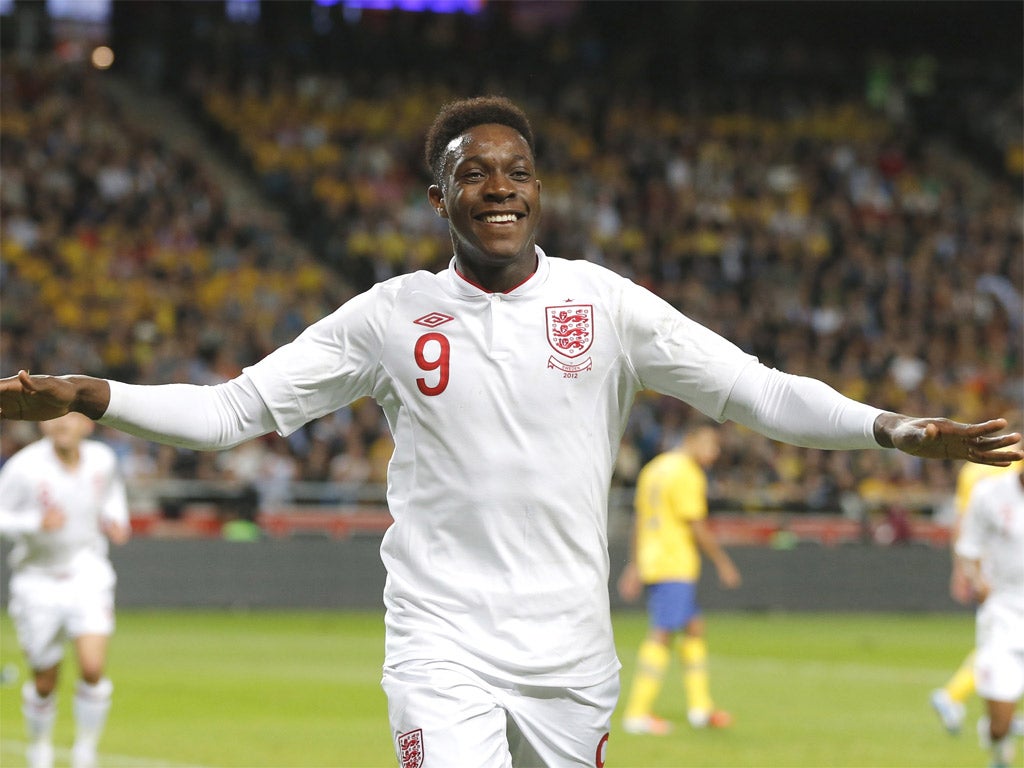James Lawton: Welbeck and Sterling strike up a very promising alliance
England had their disappointments at the end of a night that had promised so much

Waiting for Wilfried Zaha was, naturally, a matter of great compulsion. He may, after all, be a great player of England's future but when he came on with just five minutes to go, nobody needed to tell him that for a little while in his football life he was just another spectator.
Zlatan Ibrahimovic's fourth of four goals happened to deeply embarrass England's strangely uncertain goalkeeper Joe Hart but it will never be remembered for that. It was the workings of a genius that has never been the most accessible but never can it have been so persistently, and ungovernably, explicit. He has had many doubters in this land and all of us should today face life in a spirit of some considerable humility.
There were, of course, other reasons for a mood of sombre reality when we considered the prospects of the national team. If it was promising to be a good night for Roy Hodgson in his second home of Sweden, there was also the hope for a brief time of a bonus for those who argued that his familiarity with international football was a compelling argument for his appointment at one of England's lowest ebbs.
Friendlies are not supposed to matter these days. They are an unwanted intrusion into the relationship of Premier League clubs with some of their most expensive investments but the England manager, after his stints with Switzerland, the United Arab Emirates and Finland, knows that they will always be the lifeblood of a developing team.
They are about the attempt to fuse talent and character, to enhance understanding on these infrequent occasions a national manager gets to work with his team. This was no doubt the reason why he took what some club managers would have seen as the unmitigated liberty of keeping his original selection together for a whopping 60 minutes.
As it happened, there was a quite unimpeachable justification. It was that it gave young debutants Raheem Sterling and Steven Caulker more time to interact with potentially brilliant England allies in Danny Welbeck and Ashley Young, and the new centurion Steven Gerrard an extended opportunity – until the 75th minute – to remind us of his continued zeal on behalf of England.
But then of course the practicalities of Hodgson's existence – and his relationship with the paymasters of English football – could be pushed back only for so long. With 15 minutes to go, England had five new players on the field, including Ryan Shawcross plunged into the ordeal of fire provided by the ferocious Ibrahimovic scoring the second of his four goals.
Zaha arrived with just five minutes to go and with a brilliant passage of England play, in which Welbeck had been particularly impressive with his smooth and intuitive running, beginning to become a thing of beguiling memory.
For a while there had been the distinct impression of a coming together of both youthful ambition and impressive touch. Even the lordly impact of Ibrahimovic had been pushed into the margins with the fine goals of Welbeck and Caulker,
Yes, there was some clear light for England at the start of the long Swedish winter and, who knew, perhaps the arrival of such as Jack Wilshere and the hugely heralded Zaha might just have provided England with fresh confidence for something that is beginning to resemble quite menacingly a dogfight for World Cup qualification.
Hodgson, with only the shoot-out defeat to Italy in the Euro quarter-final in Kiev against his record, might have come away from Stockholm's celebratory unveiling of a new stadium still unbeaten over 90 minutes. Unfortunately, these hopeful projections had to be submitted for the approval of the extraordinary Zlatan. They were not so much declined as picked up, one by one, and cut into small pieces. As Gerrard said afterwards, you wreck any team's rhythm when you make more than three changes. England doubled that number and, as their captain also pointed out, the manager was under immense pressure to make changes. He said it more with sadness than anger, understandably enough. It means that last emotion should be reserved for all those who retain a genuine belief that the health and development of the national team is fundamental to the happiness of the football nation.
All of this, of course, could hardly have been more academic for Ibrahimovic. He is plainly aware that there are some in England who still consider him a hugely expensive and enigmatic superstar. If he has harboured any resentment during all those title-winning years with a roll call of some of Europe's greatest clubs, last night it found a perfect impression.
England had their disappointments at the end of a night that had promised so much more than an ultimately crushing defeat. For Ibrahimovic, though, it was anguish occurring on somebody else's planet. On his own, he was the master of all he surveyed and plundered.
Join our commenting forum
Join thought-provoking conversations, follow other Independent readers and see their replies
Comments